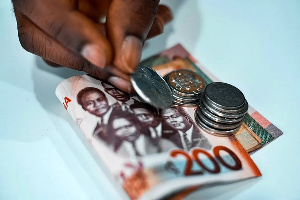There are early indications to suggest that the currency and debt markets are responding favourably to details of the Ghana Domestic Debt Exchange Programme, with the cedi recording a respectable appreciation against the US dollar following announcement of the programme.
A note published by the research arm of Rand Merchant Bank (RMB) shows that the local unit gained upward of 4 percent against the greenback to end the first trading period subsequent to the announcement – with the cedi exchanging at GH¢13.5 for US$1 and improvements on the spot and forward markets.
The cedi being the ‘standout performer’ was particularly outstanding, given the varied and mostly underwhelming outing by currencies on the continent compared to the US unit, RMB noted.
“Movements in the currency market suggest that investors viewed the debt exchange announcement over the weekend in a positive light. The Ghanaian cedi was the standout performer in the African currency market yesterday, gaining in excess of 4 percent against the US dollar to close at 13.5 in what was otherwise a mixed session for African FX,” the note read in part.
The development represents a modest, albeit welcome, change in fortunes of the cedi – which has had to endure the ignominy of being the world’s worst-performing currency after depreciating by more than 55 percent against the dollar this year, adding GH¢93.86billion to public debt stock as it rose to GH¢467.37billion at the end of September.
The DEP was introduced as government seeks fiscal space over unsustainable debt – which currently gulps in excess of 60 percent of government revenue – with the goal of qualifying for a US$3billion programme from the International Monetary Fund (IMF).
The fiscal authority is expecting holders of local debt to voluntarily exchange approximately GH¢137 of domestic notes and bonds by December 19, 2022 for new instruments maturing in 2027, 2029, 2032 and 2037 with corresponding coupon payments of O percent in 2023, 5 percent in 2024 and 10 percent from 2025 until maturity.
Market observers are keenly watching the development, even as they anticipate guidance from government’s treatment of its foreign debt.
While it is still very early days, RMB Africa Research believes a successful implementation of the DEP will see investors gravitate toward Ghanaian assets in the medium-term.
“While fiscal pressures in Ghana remain acute, given the deep valuation on offer amid signs that the country could return to a sustainable fiscal position in the medium-term, investors are beginning to rotate back into Ghanaian assets,” RMB added.
Source: thebftonline.com





